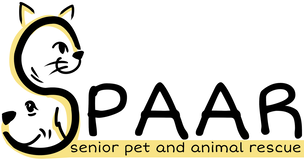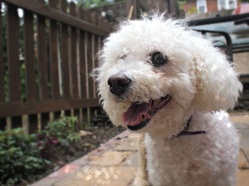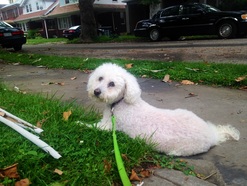While we and her foster family are managing the symptoms of this disease, we know many pet owners who have questions about elderly animals and incontinence. The first segment of this two-part blog covers animal accidents and family pets.
As animals age, incontinence can become an issue. This medical condition requires veterinary attention to rule out underlying causes. Symptoms include:
1. Your pet has accidents while it sleeps
2. Your animal needs to take constant, irregular potty breaks
3. Your furry companion cannot make it outside or to the litter box in time to go to the bathroom consistently
There is, however, a difference between excited urination and incontinence. When a dog is excited, sometimes it may dribble some urine. Excited urination is common in younger dogs. Often as a dog matures, this uncontrollable behavior usually dissipates.
If a dog is incontinent, it will dribble urine at random times, often unaware of the behavior. If you think your dog is experiencing issues related to incontinence, consult your veterinarian. Your vet will normally perform a few tests to eliminate issues like a urinary tract infection. Once underlying conditions are ruled out, medication can help control the symptoms associated with incontinence. If medication does not entirely help, or you’d like to take extra precautions, pet supply stores sell wraps for dogs, a water-resistant piece that wraps around your animal's back end that will catch urine due to incontinence. Wraps, though, aren't meant to hold urine that is released from a full bladder. You will need to remove a wrap during normal potty breaks.
Cats usually prefer to have more than one litter box that need to be kept clean daily. If you notice that your cat is frequently going to the bathroom outside of its litter box, it could be a sign of anxiety or another underlying behavior or medical issue. When in doubt, seek a the help of your veterinarian.
Remember, never punish an animal for having an accident in the house. Reprimanding your pet for this uncontrollable behavior will only create fear and anxiety, which often leads to accidents in hidden areas of your home. Adjustment to a senior lifestyle takes time for animals and owners alike. So pay close attention to your pet - body language or abnormal behaviors provide great clues. Positive reinforcement (treating or praising your pet for going to the bathroom outside or in a litter box), consistency (creating a potty break schedule and cleaning litter boxes regularly), observation (noticing new or different behaviors), and patience (knowing that the process is never perfect) are great ways to build strong communication signals between you and your pet.



 RSS Feed
RSS Feed